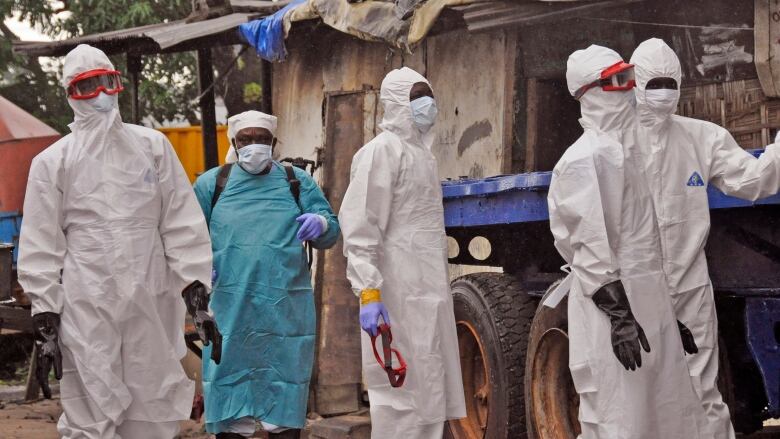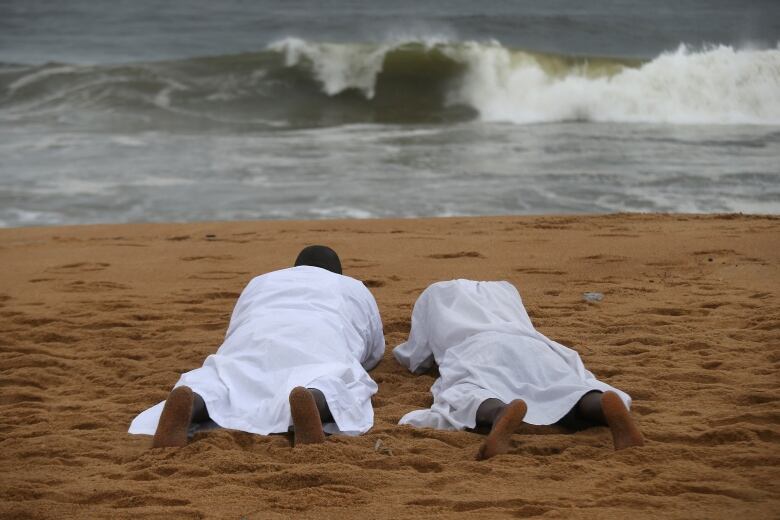Ebola outbreak: Senegal monitors contacts of 1st patient
Liberia extends stay-home order for civil servants

Senegalese authorities on Monday were monitoring everyone who was in contact with a student infected with Ebola whocrossed into the country, and who has lost three family members to the disease.
An Ebola outbreak in West Africa has killed more than 1,500 people in Guinea, Liberia, SierraLeoneand Nigeria. The university student is Senegal's first case of the dreaded disease.
The 21-year-old left Guinea on Aug. 15, just days after his brother died of the disease, according to Guinea's Health Ministry. It said that the brother apparently caught Ebola in SierraLeone.
- Experimental Ebola treatment sparks who-you-know debate
- ANALYSYS| It's not the virus, but Africa that's changed
The student travelled by road, crossing into Senegal despite a border closure. He arrived in Dakar, the Senegalese capital, on Aug. 20, according to the World Health Organization, and was staying with relatives on the outskirts of the city. The agency said that on Aug. 23, he went to a medical facility seeking treatment for fever, diarrhea and vomiting all symptoms of Ebola but also many other diseases.
But he concealed from doctors that he had had contact with infected people. He was treated instead for malaria and continued to stay with his relatives before turning up at a Dakar hospital on Aug. 26.
Senegal's Health Ministry said Sunday that it has since traced everyone the student came into contact with, and they are being examined twice a day.
PresidentMackySallsaid Monday that everything is being done to prevent any further cases of the disease in Senegal, including public awareness campaigns and television programs aimed at encouraging good hygiene practices, like regular hand-washing.
The Health Ministry in Guinea, meanwhile, said that since the young man left home, his mother and a sister have died of the disease, and two other brothers are being treated for it.
Tourist, transport hub
The arrival of the disease in Senegal, a tourist and transport hub, has raised fears that the disease could spread even farther afield.

"Countries might try to restrict travel in order to protect themselves, and it will do the opposite," said TomFrieden, director of the U.S.Centersfor Disease and Control, during a visit to the airport in Conakry, Guinea, on Monday. "If we cut off these countries, we will interfere with our ability to support them and stop the outbreak and that will actually increase the risk to the rest of the world."
The World Health Organization says up to 20,000 people may contract the virus and it could take at least six months to bring it under control.
On Monday, Liberia's president ordered most civil servants to stay home another month in an effort to stop the disease's spread.
President Ellen Johnson Sirleaf ordered non-essential workers not to come to work and promised that all government workers would still be paid. Liberia's schools are also closed.
Man escapes quarantine
The head of the World Bank said on Monday said the world's "disastrously inadequate response" to West Africa's Ebola outbreak means many people are dying needlessly.
Many are dying needlessly.- World Bank President Jim Yong Kim
In a newspaper editorial, World Bank President Jim Yong Kim said Western healthcare facilities would easily be able to contain the disease, and urged wealthy nations to share the knowledge and resources to help African countries tackle it.
"The crisis we are watching unfold derives less from the virus itself and more from deadly and misinformed biases that have led to a disastrously inadequate response to the outbreak," Kim wrote in the Washington Post.
"Many are dying needlessly," read the editorial, co-written by Harvard University professor Paul Farmer, with whom Kim founded Partners In Health, a charity that works for better healthcare in poorer countries.
In a vivid sign of the danger posed by inadequate health provision, a man escaped from an Ebola quarantine centre in Monrovia on Monday and sent people fleeing in fear as he walked through a market in search of food, a Reuters witness said.
The patient, who wore a tag showing he had tested positive for Ebola, held a stick and threw stones at a doctor from the centre in the Paynesville neighbourhood who stood at a distance and tried to persuade him to give himself up.
- Ebola epidemic unlikely to spread beyond Africa
- Ebola Cases could exceed 20,000, WHO says
- Canadian company says its Ebola vaccine looks promising
At one point, he stumbled and fell, apparently weakened by illness. Healthcare workers wearing protective clothing forced him into a medical vehicle and returned him to the facility.
More than 1,500 people have been killed in West Africa in the worst outbreak since the disease was discovered in 1976 near the Ebola river in what is now Democratic Republic of Congo. More than 3,000 people, mostly in Sierra Leone, Guinea and Liberia, have been infected.
Poor healthcare provision has exacerbated the challenge. Liberia had just 50 doctors for its 4.3 million people before the outbreak, and many medical workers have died of Ebola.












_(720p).jpg)


 OFFICIAL HD MUSIC VIDEO.jpg)
.jpg)



























































































